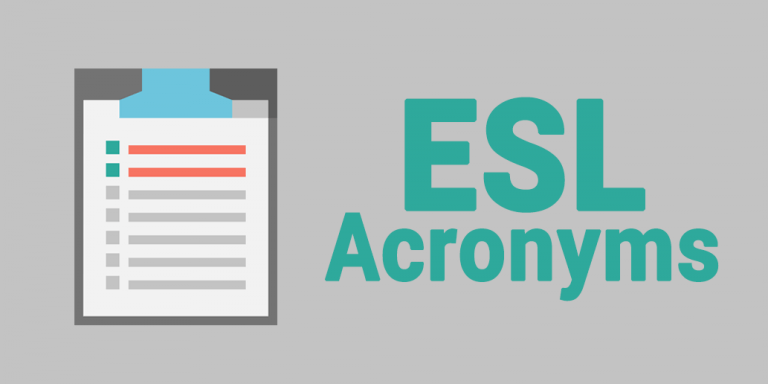The Ultimate List of ESL Acronyms: Abbreviation Dictionary

The Ultimate List of ESL Acronyms
Here is a list of ESL acronyms that you may encounter in teaching and learning English.
For example, this includes anything from proficiency tests, teaching English abroad and English teaching certification.
So if you’re exploring the options of English proficiency tests or teaching English abroad, this list of ESL acronyms gives you that basic understanding you need.
From A to Z, students and everyone with an interest can sharpen their ESL knowledge with these ESL dictionary definitions and meanings.
A
ALT (Assistant Language Teacher) – Language teachers are often associated with this term in the JET Programme.
B
BICS (Basic Interpersonal Communication Skills) – Basic language skills needed to interact in social conversation like speaking on the telephone.
C
CALP (Cognitive Academic Language Proficiency) – Formal academic learning of language skills which includes listening, speaking, reading, and writing.
CELTA (Certificate of English Language Teaching to Adults) – Cambridge University program made up of in-class hours and a practicum. It’s more recognized for teaching in Europe but is gaining recognition in Asia. Learn more about CELTA.
E
EAL (English as an Additional Language) – English language education as a complementary language to their native language.
EFL (English as a Foreign Language) – Education in English to students with different first languages (commonly used in the UK).
ELL (English Language Learner) – A non-native English student who is learning to obtain proficiency in the English language.
ELD (English Language Development) – An English program model that puts emphasis on reading, writing, listening, and speaking in a classroom setting.
ELT (English Language Teacher) – English educator for students who want to learn English.
EPIK (English Program in Korea) – Korean organization for guest English language teachers in Korean schools overseen by the Korean Ministry of Education.
ESL (English as a Second Language) – An instructional program of English language proficiency to students as a secondary language.
ESOL (English for Speakers of Other Languages) – The instruction of the English language to non-native speakers commonly used in New Zealand, the UK, Ireland, and Australia. Used synonymously with ESL and ELL.
I
IELTS (International English Language Testing System) – Internationally-recognized standardized tests for non-native English speakers often intended for those enrolling in universities and other institutions of higher education.
IDEA Proficiency Tests (IPT) – A standardized English language proficiency test that evaluates English language ability in children.
J
JET (Japanese Exchange Teaching Programme) – Largest Japanese government initiative for assistant language teacher placement in Japanese elementary, middle, and high schools. Learn more about the JET Programme.
L
LAS (Language Assessment Scales) – Assessment used for screening English language proficiency in reading, writing, and oral communication (LAS-R/W/O)
LEP (Limited English Proficient) – LEP students have minimal English skills whose primary language is not English.
S
SDAIE (Specially Designed Academic Instruction in English) – Tailoring ELL students to understand and participate in various academic subjects like social studies, geography, and science.
T
TESOL (Teachers of English to Speakers of Other Languages) – The international, professional organization for educators working with English learners. Commonly used in Canada. Learn more about TESOL.
TESL (Teaching English as a Second Language) – English teacher in the home country for English learners who have a primary language other than English. Commonly used in North America
TEFL (Teaching English as a Foreign Language) – Universal term that describes teaching English to foreign students without a regulated governing body or single representative school.
TOEFL (Test of English as a Foreign Language) – Standardized test measures English-speaking students that want to enroll in English universities.
TOEIC (Test of English for International Communication) – English proficiency test that measures students’ “everyday” English language skills in listening and reading.

What does ELB stands for?
ELB stands for English Language Bridging. These types of courses help people improve their English skills for academic study or professional environments